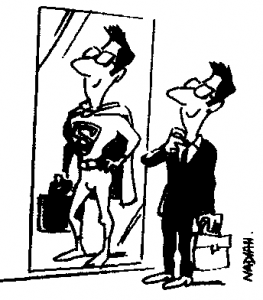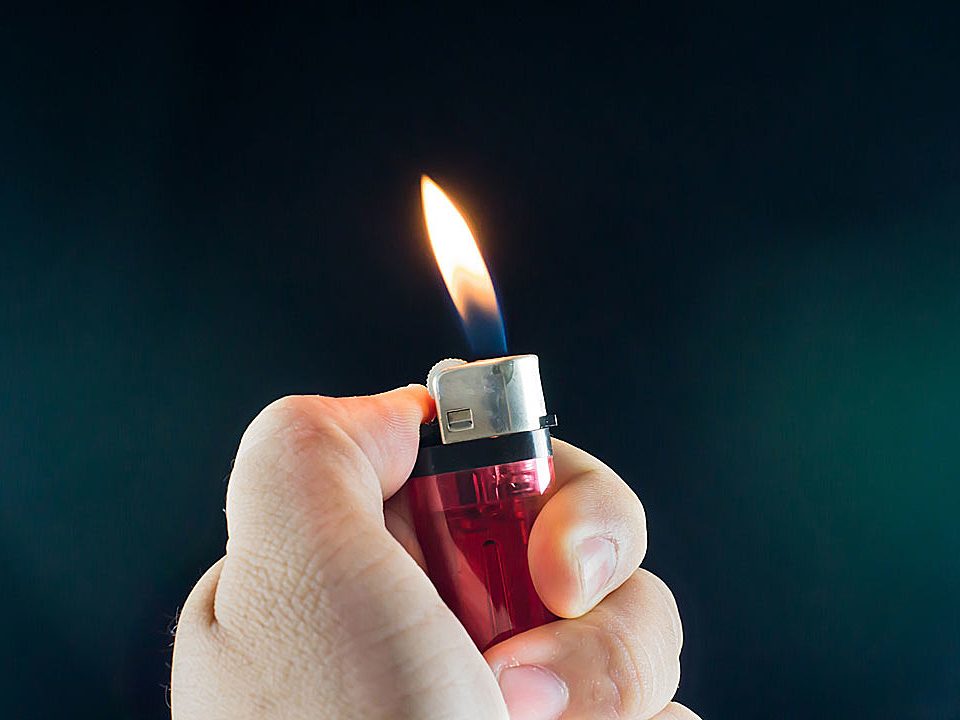How We See Ourselves
How We See Ourselves
 Last week, I listened to an audio recording of a presentation that was given by Archbishop Fulton J. Sheen in the 1950s. During his presentation, Sheen talked about an experience he had while he was a Monsignor in New York. He recounted the following story:
Last week, I listened to an audio recording of a presentation that was given by Archbishop Fulton J. Sheen in the 1950s. During his presentation, Sheen talked about an experience he had while he was a Monsignor in New York. He recounted the following story:
One morning after Mass, while I was in back of the main altar in Saint Patrick’s Cathedral in New York, a gentleman approached me and said, “Father I commute every morning into New York City from Westchester. I go to communion every morning. Naturally I come in fasting. This morning my conscience is a bit troubled. There is someone on the radio whom I positively cannot stand. He drives me crazy. His name is Monsignor Sheen. This morning on the train I was talking to a few gentlemen and I spoke very severely and critically about him. Now, if you think that what I did is serious, would you please hear my confession? Otherwise, we’ll just skip it.”
I replied, “No, there’s nothing wrong with that. As a matter of fact, I share your opinion and there are moments when I condemn him a thousand times more than you do.” I then commended the man for his piety of coming in every morning for communion. We talked for about 10 minutes and as he left, he patted me on the shoulder and said, “My, it sure is wonderful to meet a nice priest like you.” I did not tell him who I was. Maybe he’s since discovered it, but in any case we always have to be ready for some kind of humiliation.
Sheen went on to discuss the importance of humility. Here’s what he said:
You never hear anything about humility any more. People think humility means a submissiveness, a passiveness, a willingness to be walked on, or a desire to constantly live in the doghouse. No, that’s not the meaning of humility. Humility is a virtue by which we recognize ourselves as we really are. Not as we would like to be in the eyes of the public, not as our press releases say we are, but as we are when we examine our conscience.
Sheen also talked about how all of us have a tendency to believe that we are superior to others, regardless of whether we actually do have qualities or skills that are, in fact, superior to others.
When I heard Sheen tell his story and talk about humility, I thought about a silent men’s retreat that I attended in the late 1990s. The retreat master was Fr. John Hardon. At that time, Hardon was in his 80s. I’ve written before about the talk he gave concerning the importance of the sacrament of confession. It was during that particular talk that Fr. Hardon revealed that he went to confession almost every day.
After the talk, during a private meeting that I had scheduled with Fr. Hardon, I asked, “Father, you said that you go to confession almost every day. What sins do you commit that make you feel as though you need to go to confession every day? I know you don’t lie or steal. You’re never late for anything. You’re always working. And I would bet that you don’t have any problems with coveting your neighbor’s wife or goods. What is it that makes you think that you need to go to confession every day?”
Fr. Hardon smiled and responded, “If I told you, you’d probably be surprised.” Without even thinking, I shot back, “Surprise me, Father! You’re the holiest man I ever met. I can’t imagine you doing anything on a daily basis that would make you feel the need to go to confession. What are you doing every day that’s so offensive to God?”
In my mind, Hardon was a living saint who rarely did anything to offend God. Since he was the one who revealed that he went to confession almost every day, I felt as though he should at least answer my question.
Hardon appeared to be surprised by my persistence. He looked at me and said in a kind tone of voice, “Let’s just say that most of my sins have to do with pride, and that’s all I’m going to say about it.”
He was right. I was stunned by his revelation. Up until that time, I had never confessed to committing a sin that was related to pride. The sin of pride was nowhere to be found on my radar screen. On several occasions during the retreat, Fr. Hardon emphasized the critical importance of the virtue of humility, which is the only true antidote to pride.
In one of Fr. Hardon’s books, The Modern Catholic Dictionary, he described humility as, “The moral virtue that keeps a person from reaching beyond himself. It is the virtue that restrains the unruly desire for personal greatness and leads people to an orderly love of themselves based on a true appreciation of their position with respect to God and their neighbors.”
In her book, The Way of Perfection, St. Teresa of Avila wrote, “…but it remains for us to become detached from our own selves, and it is a hard thing to withdraw from ourselves and oppose ourselves, because we are very close to ourselves and love ourselves very dearly… It is here that true humility can enter.”
Archbishop Sheen talked about how we have a tendency to believe that “we are superior to others.” Fr. Hardon wrote about the “unruly desire for personal greatness.” St. Teresa of Avila wrote about how we “love ourselves very dearly.”
Do you ever believe or act as though you are superior to others? If you’ve ever made fun of or gossiped about another person, whether you realized it or not, you were behaving as though you were superior to them.
Have you ever felt as though you were greater than another person? I know I have.
How often do you love yourself more than others? Are you more patient with yourself than you are with others? Are you more forgiving of yourself than you are with others? If your answer was yes to any of those questions, then you love yourself more than you love others. If you answered no to any of those questions, you lied to yourself.
Toward the end of Archbishop Sheen’s presentation, he said that when we interact with our neighbor, humility will show up when we look for what is best in our neighbor while at the same time we look for what is worst in ourselves.
Read that statement over again and let it sink in. It’s an extremely profound statement concerning the practice of humility.
If I meet a bum on the street (my neighbor) and look for what is best in him while considering what is worst in me, I am practicing the virtue of humility. If I am severely mistreated by someone (my neighbor) and I look for what is best in him while considering what is worst in me, I am practicing the virtue of humility.
Even though Jesus was perfect, He looked for what was best in everyone He came into contact with, even the men who humiliated, tortured, and murdered Him. Even though the Son of God was truly superior to everyone He came in contact with, He still treated them as though they were more important than He was.
Even though humility is the king of all virtues, I don’t particularly like putting it into practice. Yet, I know from what our Lord and the saints taught, if I fail to embrace and practice this virtue, I will never be allowed to enter into the kingdom of God.
I’m finally beginning to understand why Fr. Hardon, who (in my opinion) was superior to almost everyone he met, felt it was necessary to regularly admit to and confess to committing the sin of pride.




1 Comment
DEAR HARRY AND GEORGETTE –
TODAY I FOUND TWO-IN-ONE STORIES FROM YOU; I CHOSE THIS INE TO READ FIRST. I’VE BEEN A “FAN” OF ARCHBISHOP FULTON SHEEN SINCE I WAS A CHILD, AND LISTENED WITH MY PARENTS TO HIS RADIO PRESENTATIONS AS A FAMILY PRACTICE. HE GRADUATED FROM SPALDING INSTITUTE IN 1913 – MY BROTHERS FOLLOWED, BOB IN 1940, AND BILL IN 1941. MARY AND I WENT TO THE ACADEMY OF OUR LADY CLOSE BEHIND OUR BROTHERS, YEARS LATER, WHILE I WAS COUNSELOR AT PEORIA NOTRE DAME, WE HAD SOMEONE WHO PRESENTED “THE LIFE OF … SHEEN” TO OUR STUDENTS IN ASSEMBLY. HE MADE NO MENTION OF FULTON’S HAVING GRADUATED FROM S.I. I MADE IT A POINT TO MEET HIM AFTER THE TALK. I OFFERED TO TAKE HIM TO SEE THE GRADUATION PICTURE FOR THE CLASS OF 1913 ON OUR SCHOOL WALL… HE WAS SURPRISED TO FIND BISHOP SHEEN IN THE MIDDLE OF THAT PICTURE! HE HAD HIS PHOTOGAPHER TAKE A PICTURE OF THE PICTURE. I’VE ALWAYS HOPED THAT THE “HISTORIAN” ADDED THIS BIT OF INFORMATION TO HIS FUTURE PRESENTATIONS! I LOVED YOUR EXPLANATION OF HUMILITY!! BLESSINGS AND LOVE, SISTER ROBERTA